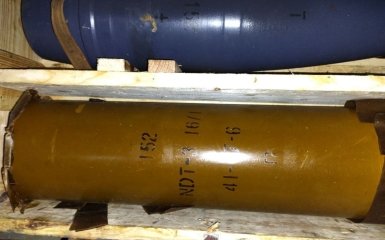The occupiers talk about the shortcomings of the configuration of 152 mm projectile charges of Korean artillery shells and note that their firing range is different.
North Korea supplies the Russian Federation with defective shells
Artillerymen of the Russian army complain about the shell quality provided by North Korea.
The occupiers talk about the shortcomings of the configuration of 152 mm projectile charges of Korean artillery shells and complain that their firing range is different.
In this regard, the Russians decided to test NDT-3 projectile charges up to 152 mm projectiles and chose five random Korean charges with the same marking.
According to the occupiers, it turned out that projectile charges do not always contain a de-copper in the form of a skein of lead or tin wire, which is designed to remove from the gun barrel copper that has settled from the projectile's lead belt.
Charges also have apparent differences in powder colour, indirectly indicating the difference in combustion.
Also, some cases have traces of the opening of the sealing caps, which could lead to moisture ingress, affecting the quality of the gunpowder.
In addition, the inspection showed that many cartridges contained different amounts of gunpowder.

Artillerymen of the occupying army assume that the following factors can influence the difference in the flight range of shells delivered from North Korea:
alternation of the presence/absence of a copper reducer, which causes a difference in the force of resistance to the passage of the projectile through the barrel;
different quality of gunpowder due to sealing failure and subsequent improper storage;
an uneven amount of powder in the charges is possible.
North Korea sent about 2,000 containers of weapons to Russia
American intelligence has established that Russian ships have been regularly visiting the North Korean port of Rason since August. North Korea sent about 2,000 containers of weapons to the Russian Federation.
The Rason Special Economic Zone, once a North Korean experiment in limited capitalism, appears to have become the epicenter of the isolated country's growing cooperation with Russia, Reuters writes.
In recent months, there have been clear signs that this region has "revived". For the first time since 2018, ships are moored here, and satellite images indicate a surge in trade from both the port and the rail line to Russia.
An expert on the economy of North Korea at the University of South Korea, Jeong In-li, said that after the start of cooperation between North Korea and the Russian Federation against the background of the war in Ukraine, Russia may direct more tourists to North Korea.

